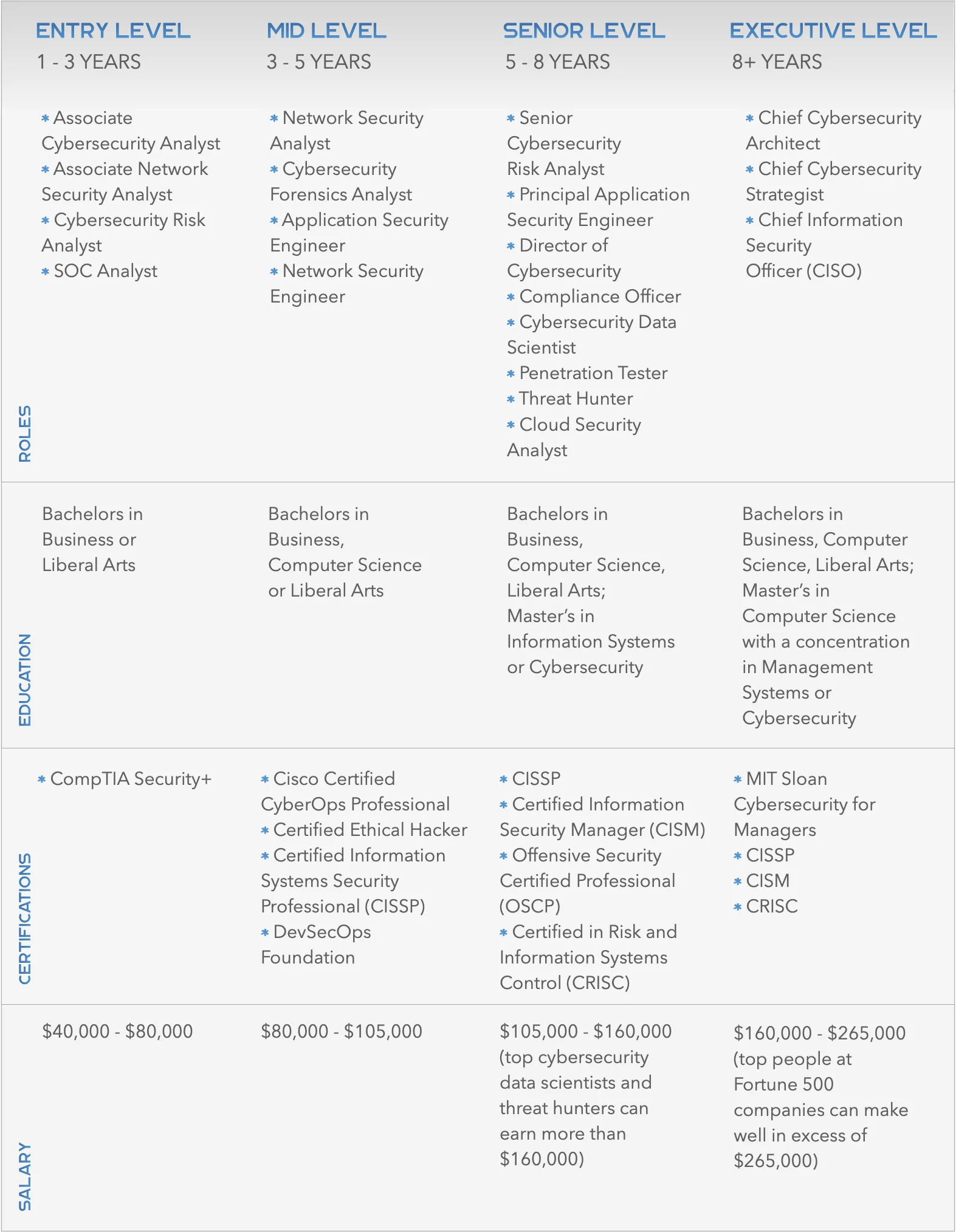The Best Cybersecurity Success Path

The landscape of cybersecurity careers has evolved significantly, becoming more structured as the frequency of security breaches has risen and the expertise needed to safeguard organizations has grown more specialized.
Individuals who initially joined the field from roles like IT support or network management, often without formal security training, have typically enhanced their expertise through additional certifications or further academic studies.
This evolution has led to well-defined career trajectories in cybersecurity, complete with specific educational and professional milestones.
Notably, the Information Systems Security Association (ISSA) International has crafted an exemplary career progression model known as the Cyber Security Career Lifecycle (CSCL). This model outlines five critical stages that guide both newcomers and seasoned professionals in identifying the necessary education, experience, and certifications for career advancement.
The ISSA’s model categorizes cybersecurity roles into five broad categories, each encompassing various job titles and competencies. Below is an overview of these stages, detailing the typical experience level, the duration one might expect to spend at each stage, and the salary expectations for the roles within each:
Entry-Level – This stage includes beginners who are just starting their journey in cybersecurity, often with basic IT knowledge and perhaps an entry-level certification.
Associate-Level – Professionals here have a few years of experience, possibly with foundational cybersecurity certifications, focusing on developing more specialized skills.
Mid-Level – This phase includes those who have substantial experience, typically several years, and might hold advanced certifications. They handle complex security challenges with more autonomy.
Senior-Level – At this level, individuals are experts with extensive experience, often leading teams or significant projects, and require advanced strategic thinking and management skills.
Executive-Level – Here, professionals not only have deep technical expertise but also business acumen, often involved in setting strategic directions for security within organizations.
Each step up the ladder generally correlates with increased responsibility, higher salary potential, and deeper involvement in organizational security strategy.

The entry-level professional category is aimed at individuals without prior experience in cybersecurity who are keen to enter the industry. Although a significant number of cybersecurity professionals possess formal education in computer science, there isn’t a barrier preventing those from diverse academic backgrounds, such as music or liberal arts, from thriving in this field.
Individuals with journalism backgrounds can excel as threat researchers due to their skills in fact-finding and clear communication of complex topics. Similarly, professionals transitioning from careers in law enforcement or the military are well-positioned for success in cybersecurity. Their experience in detective work or strategic intelligence in the military provides a robust foundation for cybersecurity roles.
Students in computer science or business might be drawn to cybersecurity due to the plentiful job prospects and career progression opportunities. However, true success in this field requires a genuine passion for cybersecurity and a commitment to exploring and mastering the area within it that sparks your curiosity.


Individuals at the entry-level typically begin their careers in areas like IT support or network management. However, those with degrees in business or liberal arts who are in the process of obtaining security certifications can also secure entry-level positions.
A frequent starting role is that of an analyst within a Security Operations Center (SOC). This position might involve routine tasks, yet after approximately 12 to 18 months of experience in an SOC, along with achieving some foundational certifications, individuals are ready to advance.
It’s important here to reflect on personal strengths and interests. Cybersecurity specialists recommend that newcomers focus on the security domain that resonates with them personally. For instance, some might thrive in technical roles like penetration testing or threat analysis but may not be suited for or interested in leadership roles.
Job Titles Include: Associate Cybersecurity Analyst, Associate Network Security Analyst, Cybersecurity Risk Analyst, SOC Analyst
Educational Background: Bachelor’s degree in business, liberal arts, or related fields, Certifications like CompTIA Security+
Salary Range: $40,000 – $80,000

At this stage of the career journey in cybersecurity, individuals have a firm grasp on broad security concepts and are beginning to delve deeper into areas that spark their interest.
For instance, those who began in network administration might now be advancing towards specializing in network or cloud security architecture. Alternatively, others might find their niche in incident response, aiming to refine their skills in digital forensics.
There are also those with programming backgrounds and computer science education who have chosen to specialize in DevSecOps, a field where demand is high due to the need for secure software development practices from inception to deployment. Organizations highly value developers who embed security throughout the development process, making resources like the DevSecOps Foundation valuable for career development.
Job Titles Include: Network Security Analyst, Cybersecurity Forensics Analyst, Application Security Engineer, Network Security Engineer
Educational Background: Bachelor’s degree in business, computer science, or liberal arts, Certifications such as Cisco Certified CyberOps Professional, Certified Ethical Hacker, Certified Information Systems Security Professional (CISSP), DevSecOps Foundation
Salary Range: $80,000 – $105,000


At this career phase in cybersecurity, professionals are typically at the helm of threat intelligence operations, leading penetration testing, and managing incident response initiatives. Many of these individuals prefer technical engagement over managerial roles, focusing on direct event response or collaborating with clients to identify security gaps and enhance their security frameworks.
Others might pursue a path in risk analysis, where they communicate potential business risks to the Chief Information Security Officer (CISO) and senior leadership. Some individuals with this focus might have transitioned from accounting roles, especially within financial sectors like banks or investment firms.
Meanwhile, those with a tech background might specialize in compliance and regulatory frameworks. For example, expertise in the EU’s GDPR would require not only technical skills but also an understanding of international policy and business law. Similarly, proficiency in PCI DSS would necessitate experience in technology, specifically in e-commerce security and web management. At this level, cyber data scientists are expected to have a robust understanding of AI’s potential and its application in cybersecurity.
Job Titles Include: Senior Cybersecurity Risk Analyst, Principal Application Security Engineer, Director of Cybersecurity, Compliance Officer, Cybersecurity Data Scientist, Penetration Tester, Threat Hunter, Cloud Security Analyst
Educational Background: Bachelor’s degree in business, computer science, or liberal arts, Master’s degree in Information Science or Cybersecurity, Certifications like CISSP, Certified Information Security Manager (CISM), Offensive Security Certified Professional, Certified in Risk and Information Systems Control (CRISC), Certificate of Cloud Security Knowledge
Salary Range: $105,000 – $160,000, with exceptional threat hunters earning nearly $250,000.

At the pinnacle of the cybersecurity career ladder, security executives, commonly known as Chief Information Security Officers (CISOs) in larger organizations, are experienced professionals adept at both leadership and strategic project management. These individuals often have varied professional histories; some might have come up through IT ranks, while others might have originated from banking sectors handling risk and compliance.
The typical educational trajectory for aspiring CISOs includes obtaining a computer science degree or a business degree with an IT management focus. Although not mandatory, a master’s degree in computer science with a cybersecurity specialization can be advantageous, especially for those looking to differentiate themselves after years in the industry.
Top security leaders need to communicate risks in terms of business impact, such as effects on profitability, sales, growth, and corporate reputation, rather than solely focusing on technical jargon.
Other high-paying executive cybersecurity roles include:
Chief Cybersecurity Architect: Responsible for the strategic planning, design, testing, implementation, and maintenance of security systems.
Chief Cybersecurity Strategist: Develops comprehensive cybersecurity strategies from the ground up.
Job Titles Include: CIO, Chief Cybersecurity Architect, Chief Cybersecurity Strategist, CISO
Educational Background: Bachelor’s degree in business, computer science, or liberal arts, Master’s degree in computer science or information science, ideally with a focus on management systems or cybersecurity, Professional development courses like MIT Sloan’s Cybersecurity for Managers, Certifications such as CISSP, CISM, CRISC
Salary Range: $160,000 – $265,000, with the highest earners often exceeding $265,000.

Accumentum® is the leading training provider for a vast array of technology vendors including AWS, Cisco, CIW, CompTIA, EC-Council, Fortinet, GIAC, HRCI, ISACA, ITIL, Microsoft, Palo Alto, PMI, Scrum, SHRM, Veritas, VMWare, and more.


